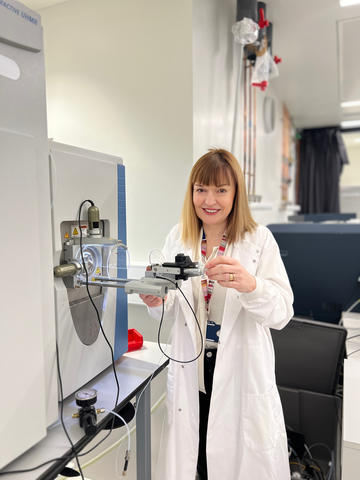Carol Robinson Inducted into Prestigious American Philosophical Society (APS) for 2023
Dame Carol Robinson, the Dr. Lee's Professor of Chemistry and Director of the Kavli Institute for Nanoscience Discovery at Oxford University, has received recognition for her pioneering work in mass spectrometry techniques spanning more than three decades. Her research has revolutionized our understanding of protein structures and interactions, particularly in relation to diseases.

Expressing her gratitude, Professor Robinson commented, "Being part of the APS membership is truly humbling, with luminaries like Benjamin Franklin and Albert Einstein. This honor acknowledges the immense talent of my research groups throughout the years, and I am deeply grateful for their unwavering dedication and commitment. Without their efforts, we wouldn't have achieved the remarkable breakthroughs we have."
Established in 1743 by Benjamin Franklin to promote knowledge, the APS stands as the oldest learned society in the United States. It distinguishes itself by comprising distinguished academics from a wide range of disciplines, including scientists, humanists, social scientists, and leaders in civic and cultural affairs. Over 260 APS members have been honored with Nobel Prizes since 1900.
Professor Robinson's work primarily focuses on native mass spectrometry, a technique that preserves protein interactions in the gas phase. This approach offers unprecedented insights into protein structure, binding partners, and dynamics, complementing other methods while also serving as a powerful tool in its own right. Currently, Professor Robinson is developing methods to correlate the status of intact protein receptors or transporters with their changing modifications during disease progression. This research has the potential to unveil new therapeutic approaches, including those for cancer treatment.
These achievements are particularly remarkable considering Professor Robinson's journey. Despite leaving school at 16 and taking an eight-year career break to raise her children, she managed to establish her career in a predominantly male-dominated field. Her fascination with mass spectrometry began during her time as a lab technician at pharmaceutical company Pfizer, where she received encouragement to pursue a degree at a technical college. After seven years of studying while working full-time, she earned a place at Cambridge University to pursue a Ph.D., which she completed in just two years.
Reflecting on her experiences, Professor Dame Carol Robinson shared, "Throughout my career, I have always felt incredibly supported in the Chemistry Department at Oxford. The department fosters a collegiate atmosphere that encourages ambitious research and thrives on intellectual freedom. It has been a pleasure to come to work every single day."
Following her academic hiatus, Professor Robinson embarked on a post-doctoral position at Oxford University, where she initially began utilizing mass spectrometry to analyze protein folding. In 2001, she became the first female professor of chemistry at Cambridge and accomplished the same historic feat at Oxford eight years later.
In 2016, Professor Robinson co-founded OMass Technologies (now OMass Therapeutics), a spin-out company that employs innovative biochemistry techniques, native mass spectrometry, and custom chemistry to develop novel drug therapies for immune system and genetic disorders. Five years later, in 2021, she became the inaugural Director of the Kavli Institute for NanoScience Discovery at Oxford University, an interdisciplinary science institute dedicated to studying structures and materials at an ultra-small scale.
Her numerous accolades include the 2022 Benjamin Franklin Medal in Chemistry, the 2022 Louis Jeantet Prize for Medicine, the European Chemistry Society's 2021 Gold Medal, the Science History Institute's 2020 Othmer Gold Medal, the Royal Academy of Belgium's Academy Prize, and the Royal Society's 2019 Royal Medal. In 2013, she was appointed Dame Commander of the Order of the British Empire (DBE) in recognition of her contributions to science and industry.
For a complete list of newly elected APS members for 2023, please visit the APS website.
Since April 2021, Oxford University's KAVLI Institute for Nanoscience Discovery is proudly serving as a hub for research groups from seven different departments spanning both the medical and physical sciences, including Professor Carol Robinson's Group from the Department of Chemistry.


